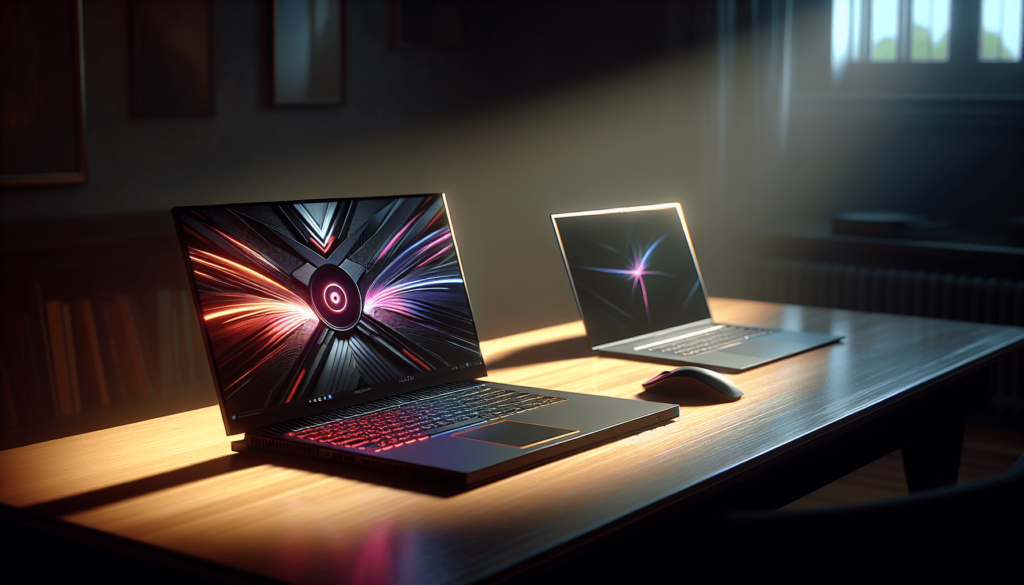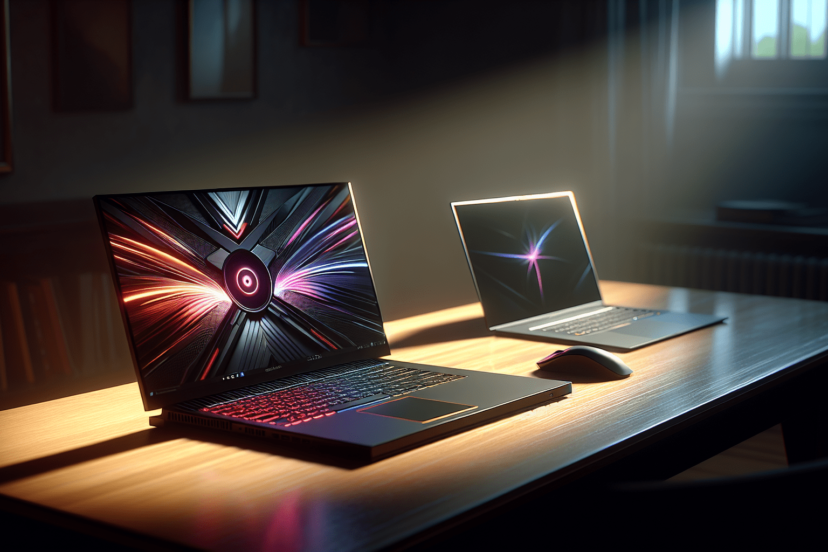What Is The Difference Between A Gaming Laptop And A Regular Laptop?
Curious about the disparity between gaming laptops and regular laptops? We’ve got you covered! In this article, we will break down the key distinctions between these two types of laptops, guiding you through the realms of performance, graphics, design, and more. Whether you’re a tech enthusiast or someone looking to step up their gaming experience, this article will equip you with the essential knowledge to make an informed decision. So sit back, relax, and let’s delve into the exciting world of gaming laptops!

Design and Build
When it comes to design and build, gaming laptops often have a more aggressive and eye-catching aesthetic compared to regular laptops. They are designed to appeal to gamers with features like angular edges, LED lighting, and bold graphics. These design elements not only make gaming laptops look stylish but also help create an immersive gaming experience. On the other hand, regular laptops prioritize a more sleek and professional look, with a focus on portability and versatility. They are designed to be practical and suitable for a wide range of uses, including work, studying, and entertainment.
In terms of build quality, gaming laptops are often built with sturdiness in mind. They are typically made with robust materials that can withstand the demands of intense gaming sessions. Regular laptops, on the other hand, prioritize portability and may be constructed from lighter materials to make them easier to carry around. While regular laptops can still be durable, gaming laptops are generally built to be more rugged and withstand the wear and tear that comes with heavy gaming use.
Hardware Specifications
Gaming laptops are known for their powerful hardware specifications, which are essential for delivering a smooth and immersive gaming experience. Let’s delve into the key hardware components that set gaming laptops apart from regular laptops.
Processor
The processor, or CPU, is the brain of a laptop. Gaming laptops usually come equipped with high-performance processors that can handle the demanding requirements of modern games. These processors often have more cores and a higher clock speed to ensure smooth gameplay and reduce lag. Regular laptops, on the other hand, typically have processors that are more focused on energy efficiency and everyday tasks rather than gaming performance.
Graphics Card
The graphics card, or GPU, is one of the most critical components in a gaming laptop. Gaming laptops are equipped with dedicated graphics cards that provide the necessary processing power to render complex gaming visuals and deliver high frame rates. These GPUs are designed to handle the demands of graphically-intensive games and support advanced features like ray tracing and high-resolution textures. Regular laptops, on the other hand, often rely on integrated graphics, which are suitable for basic tasks but not ideal for gaming.
Memory and Storage
Gaming laptops generally have more RAM (random-access memory) compared to regular laptops. This is crucial for multitasking and running demanding games. Additionally, gaming laptops often feature SSDs (solid-state drives) for quick boot times and faster loading of games. Regular laptops may have less RAM and may come with traditional hard drives instead of SSDs, which can lead to slower performance when running resource-intensive applications.
Display
Gaming laptops usually sport high-refresh-rate displays, typically 120Hz or higher, to provide smooth and fluid visuals, reducing motion blur and enhancing the overall gaming experience. These displays prioritize response time and refresh rate over color accuracy, making them ideal for gaming. Regular laptops, on the other hand, may have lower refresh rates and focus more on accurate color reproduction for tasks like photo and video editing.
Battery
Given the power-hungry nature of gaming laptops, they often have larger batteries to support extended gaming sessions. However, due to the demands of high-performance components, gaming laptops generally have shorter battery lives compared to regular laptops. Regular laptops are designed for longer battery life and are optimized for everyday tasks, including web browsing, document editing, and video streaming. It’s important to consider your usage requirements when choosing between a gaming laptop and a regular laptop.

Cooling System
One of the critical aspects of a gaming laptop is its cooling system. Gaming laptops produce a significant amount of heat due to their powerful components, and efficient cooling is essential to prevent overheating and ensure optimal performance.
Fan and Ventilation
Gaming laptops usually employ multiple fans and larger heatsinks to dissipate heat efficiently. These fans are designed to operate at higher speeds to increase airflow and keep the internal components cool during intense gaming sessions. The ventilation system on gaming laptops typically consists of strategically placed vents to facilitate the intake of cool air and the expulsion of hot air. Regular laptops, on the other hand, have simpler cooling systems with fewer fans and smaller heatsinks, as they do not generate as much heat during regular usage.
Heat Management
To enhance heat management further, gaming laptops often utilize advanced heat management technologies. These technologies may include heat pipes, which transfer heat away from critical components, and vapor chambers, which efficiently distribute and dissipate heat across a larger surface area. Some gaming laptops even incorporate liquid cooling systems to provide enhanced thermal performance. Regular laptops, however, generally rely on simpler heat management solutions due to their lower power requirements.
Keyboard and Touchpad
The keyboard and touchpad are essential aspects of any laptop, and gaming laptops often come with features designed specifically for a superior gaming experience.
Backlit Keys
Gaming laptops commonly feature backlit keys, allowing gamers to play in low-light environments and enhancing the overall aesthetics. These backlit keys are usually customizable, with various colors and lighting effects to suit individual preferences. Regular laptops may also offer backlit keys, but they are typically more focused on providing functionality rather than customization options.
Key Response and Travel Distance
Gaming laptops often have keyboards with a greater key travel distance and faster response times compared to regular laptops. This improves the typing and gaming experience by providing tactile feedback and quicker inputs. Regular laptops, while still offering comfortable typing experiences, may have keyboards optimized for everyday tasks rather than gaming.
Touchpad Precision
Since gaming primarily involves using a mouse, touchpad precision is not as significant of a concern for gaming laptops. However, gaming laptops usually still feature high-precision touchpads for general usage and navigation. Regular laptops focus more on touchpad accuracy and gesture support for tasks like web browsing and document editing.

Connectivity Options
Both gaming laptops and regular laptops offer a range of connectivity options, but gaming laptops often provide additional ports and inputs to cater to the needs of gamers.
Ports and Inputs
Gaming laptops typically offer a larger variety of ports and inputs, including multiple USB ports (Type-A and Type-C), HDMI ports, Ethernet ports, and audio jacks. These additional ports allow gamers to connect various peripherals like gaming mice, keyboards, external monitors, headsets, and more. Regular laptops generally have fewer ports and inputs, as their primary focus is on versatility and portability.
Wireless Connectivity
Wireless connectivity options, such as Wi-Fi and Bluetooth, are standard in both gaming laptops and regular laptops. However, gaming laptops often prioritize faster Wi-Fi standards, such as Wi-Fi 6, to ensure minimal latency during online gaming sessions. Regular laptops usually include standard Wi-Fi standards suitable for regular internet usage.
Audio and Sound Quality
Audio plays a crucial role in gaming, and gaming laptops often feature specialized audio systems to deliver immersive sound experiences.
Speakers
Gaming laptops often come with larger, more powerful speakers that offer enhanced bass and a wider soundstage. These speakers are optimized for gaming, ensuring clear and immersive audio during gameplay. Regular laptops, while still providing decent audio quality, may not prioritize gaming-specific features in their speaker systems.
Audio Processing
Some gaming laptops include advanced audio processing technologies, such as virtual surround sound, to create a more realistic gaming audio experience. These technologies allow gamers to hear directional cues more accurately, enhancing their gaming performance. Regular laptops typically do not emphasize these audio processing features, focusing more on general-purpose audio quality.

Gaming-Specific Features
Apart from the hardware specifications mentioned earlier, gaming laptops often come with additional features that enhance the gaming experience.
Screen Refresh Rate
Gaming laptops generally offer high-refresh-rate displays, typically ranging from 120Hz to 300Hz or even higher. A higher refresh rate provides smoother motion and reduces motion blur, making gameplay feel more responsive and fluid. Regular laptops, on the other hand, often have standard 60Hz displays, which are sufficient for regular tasks but may not provide the same level of smoothness for gaming.
Gaming Software and Settings
Gaming laptops often include pre-installed gaming software and utilities that allow users to customize their gaming experience. These software packages may include features like game optimization, performance monitoring, and RGB lighting control. Regular laptops generally do not come with such specialized gaming software, as their focus is more on general-purpose usage.
RGB Lighting
RGB (Red, Green, Blue) lighting has become a popular feature in gaming laptops. These customizable lighting effects allow gamers to personalize their laptops and create a vibrant gaming atmosphere. RGB lighting can be found on the keyboard, chassis, and even the logo of gaming laptops. Regular laptops may also offer backlit keyboards, but they typically do not have the same level of RGB lighting customization options.
Price
Gaming laptops often come with a higher price tag compared to regular laptops, primarily due to their specialized gaming hardware and features. The high-performance components and gaming-focused design elements contribute to the elevated cost. Regular laptops, being more versatile and catering to a broader audience, are generally more affordable. However, it’s essential to consider your specific needs and budget when deciding between a gaming laptop and a regular laptop.
Comparative Cost
When comparing similar specifications, a gaming laptop will typically cost more than a regular laptop. This cost difference can be attributed to the dedicated gaming hardware and specialized features found in gaming laptops. For example, a gaming laptop with a high-refresh-rate display, a powerful graphics card, and ample memory may cost more than a regular laptop with similar specifications geared towards everyday usage. It’s essential to weigh the importance of these gaming-specific features against your budget constraints.
Portability and Weight
Portability is a crucial factor to consider when choosing between a gaming laptop and a regular laptop. Gaming laptops tend to be heavier and bulkier due to their high-performance hardware and enhanced cooling systems, which can make them less suitable for frequent travel or daily commutes.
Size and Weight
Gaming laptops generally have larger and thicker chassis to accommodate the powerful components and cooling mechanisms. This results in greater weight and bulk compared to regular laptops, which are designed to be lightweight and slim. Regular laptops prioritize portability, making them more suitable for individuals who need to carry their laptops with them regularly.
Battery Life
Gaming laptops typically have shorter battery lives compared to regular laptops due to the high power consumption of their hardware. The powerful processors and graphics cards in gaming laptops require more energy to operate, which can impact the overall battery life. Regular laptops, on the other hand, are optimized for longer battery life and energy efficiency, allowing users to work or browse the web for extended periods without needing to recharge. If you need a laptop that can offer all-day battery life without being plugged in, a regular laptop may be a more suitable choice.
Upgrade Options
The ability to upgrade and expand a laptop’s hardware is an important consideration, especially for individuals who want to future-proof their investment.
Expandability
Gaming laptops often provide better options for expandability. They may have additional RAM slots, multiple drive bays, and easy access to internal components, making it easier to upgrade storage, memory, or even the graphics card. Regular laptops, while still offering some upgrade options, may have more limited expansion capabilities due to their compact and slim designs.
What Is The Difference Between A Gaming Laptop And A Regular Laptop?
Component Compatibility
It is essential to ensure that any upgrades you plan to make in the future are compatible with the laptop’s existing hardware. Gaming laptops generally have higher compatibility with various components due to their dedicated gaming hardware. They are often designed with compatibility in mind, allowing users to replace or upgrade components without encountering significant compatibility issues. Regular laptops, while still offering some degree of compatibility, may have more limitations regarding component upgrades.
In conclusion, gaming laptops and regular laptops differ in various aspects, from design and build to hardware specifications and features. Gaming laptops prioritize powerful hardware, aggressive design elements, and gaming-centric features to provide an immersive gaming experience. Regular laptops, on the other hand, emphasize portability, versatility, and longer battery life to cater to a broader range of users and tasks. Choosing between a gaming laptop and a regular laptop ultimately depends on your specific needs, budget, and preferences.




